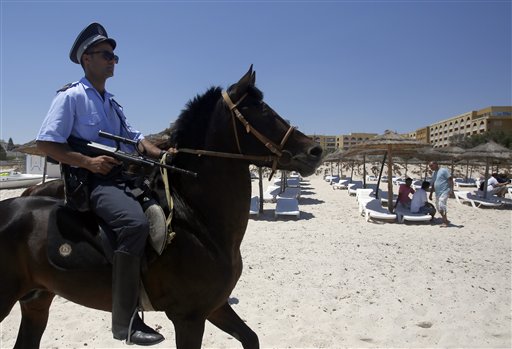Tunisia hunts down accomplices in beach attack

A Tunisian police officer on horse patrols the beach in front of the Imperial Marhaba Hotel in Sousse, Tunisia, Sunday, June 28, 2015. Tunisia’s top security official says 1,000 extra police are being deployed at tourist sites and beaches in the North African nation. AP PHOTO/DARKO VOJINOVIC
TUNIS, Tunisia—The latest developments on the attack that killed 38 tourists on a beach in Tunisia:
4:05 p.m.
Investigators say they are searching for one or more accomplices in the attack on a luxury hotel in the Tunisian resort city of Sousse that killed at least 38 people—some of them sunbathers on the beach.
The Interior Ministry’s spokesman said on Sunday that investigators are “sure” the attacker, a 24-year-old student killed in the assault on the Imperial Marhaba Hotel, had help.
Mohammed Ali Aroui told The Associated Press that “we are sure that others helped but did not participate” except indirectly.
He said the father of the attacker, identified as Seifeddine Rezgui, and three roommates in Kairouan where he studied have been detained for questioning.
2:30 p.m.
Ireland’s foreign affairs minister says an Irish couple missing since Friday’s gun attack at a Tunisian beach resort is among the dead.
Charlie Flanagan didn’t confirm the pair’s names, but they were identified locally as Laurence and Martina Hayes, both reportedly in their 50s.
Sunday’s announcement brings the number of Irish victims to three.
An Irish mother-of-two, Lorna Carty, was earlier confirmed as a victim of Friday’s attack on the Sousse beach resort in Tunisia.
A total of 38 tourists were killed when a student armed with a Kalashnikov and grenades opened fire at the resort in Sousse.
1:50 p.m.
Britain’s home secretary says the number of Britons confirmed killed in the Tunisia beach resort attack is expected to rise.
Theresa May told reporters that the confirmed figure remained at 15, but “we should expect that that number is going to rise.”
The Britons were among the 38 people killed at the Sousse resort Friday, and authorities are still working to determine the identities of all the dead.
Tunisian authorities have said victims were from Britain, Germany, Ireland, Belgium and Portugal, and no Tunisians were killed.
1:40 p.m.
The owner of a Tunisian resort hotel insists there was no security breakdown during an attack by a gunman with alleged ties to the extremist Islamic State group who killed at least 38 tourists in Sousse, because “unfortunately the hotel security (guards) are not armed.
Zohra Idriss of Hotel Riu Imperial Marhaba says it has five or six guards on the sandy beach.
“How can they defend themselves against someone who has a Kalashnikov and who is killing them?” Idriss said. “They tried to beat him with chairs, with the vases of flowers but it was impossible. It was all very, very quick.”
12:05 p.m.
A major German tour operator says around 250 of its customers have chosen to return early from their vacations in Tunisia after the attack on tourists but most people visiting the country—around 3,500—are staying on.
After Friday’s attack on a beach in Sousse, tour operator TUI offered free cancelations or re-bookings for customers who had reserved vacations in Tunisia through Sept. 15. It said it had received about 500 calls by Sunday from people taking up that offer, and that Spain’s Canary Islands, Turkey and Egypt topped the list of alternative destinations that their customers chose.
One German has been confirmed dead and another injured in the attack Friday on a beach resort. Thirty-eight people were killed in Tunisia’s worst terrorist attack.
10:10 a.m.
Britain’s Foreign Office has updated its travel advice to Tunisia, urging vigilance and warning that further terrorist attacks in the North African nation’s tourist resorts are possible.
The ministry is warning Sunday against all travel to Tunisia’s militarized southern zone, all travel anywhere within 5 kilometers (3 miles) of Tunisia’s border with Libya and all travel to the country’s Chaambi Mountain national park area.
It also advised against all but essential travel to much of Tunisia’s south and along its western border with Algeria.
The ministry says possible attacks could stem from “individuals who are unknown to the authorities and whose actions are inspired by terrorist groups via social media.”
At least 15 Britons were among the 38 people killed at a Tunisian beach resort Friday.
9 a.m.
Tunisia’s top security official says 1,000 extra police are being deployed at tourist sites and beaches in the North African nation.
Interior Minister Mohamed Najem Gharsalli made the announcement late Saturday. He said “we don’t want to make tourist establishments into barracks, that’s not our goal. But we must act to guarantee the security of the tourist sector.”
Thousands of tourists fled Tunisia on Saturday after the country’s worst terrorist attack killed 38 people. Hundreds more were to leave Sunday.
The Friday attack on tourists at a beach is expected to be a huge blow to Tunisia’s tourism sector, which made up nearly 15 percent of the country’s gross domestic product in 2014. It also comes after 22 people were killed in March at the National Bardo Museum in Tunis.














